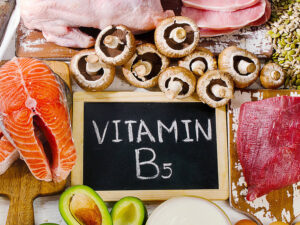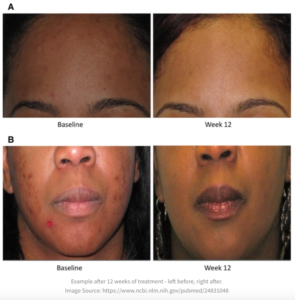Pantothenic Acid (B5) as Cure for Acne
We’ve spent several weeks discussing the importance of B vitamins. If you’ve been reading along, I hope you got your money’s worth. We’ve learned that B vitamins play key roles in energy production, brain health, cardiovascular health, and the development and growth of healthy babies. We’ve also learned that B vitamins can help with migraines and effect your cholesterol on the same level as statins. Let’s keep the discussion going as we learn about B5.
Vitamin B5 (Pantothenic acid)
Pantothenic acid is present in pretty much everything you eat that isn’t an oil. Like the other Bs, it works as a coenzyme in the process of converting fats, proteins, and carbohydrates to energy. It also participates in more than 100 steps in the process of making lipids, neurotransmitters, hormones, and hemoglobin. But it’s most widely known for its role in healthy hair, skin, and eyes.

Pantothenic Acid Deficiency Symptoms
- Tingling and numbness in the extremities
- Abdominal pains
- Headaches
- Fatigue
Because almost every food contains B5, deficiency rarely appears in healthy individuals from western industrialized nations.
Why Might Deficiency Occur?
Pantothenic acid is used in ethanol metabolism. So, if you’re a heavy drinker (15 servings a week for men; 8 servings a week for women) and you experience some of the B5 deficiency symptoms, you may want to consider a supplement.
Sources of Pantothenic Acid
- All plant and animal foods (except pure oils since pantothenic acid is water-soluble)
- Beef, chicken, and organ meats (the best sources)
- Sweet potatoes, avocados, and mushrooms top the list of plant foods
- Supplement (calcium pantothenate is the standard effective form)
Recommended Pantothenic Acid Intake
Both men and women need about 5 mg/day of pantothenic acid. There is no tolerable upper limit for pantothenic acid, which means it’s almost impossible to get too much.
Panthenol (Pro-Vitamin B5)
Panthenol (Pro-Vitamin B5) is an alcohol derivative of pantothenic acid that appears in food, supplements, and a wide variety of topical medicinal creams and hygiene products. It’s in most shampoos. In fact, an entire brand of shampoo, Pantene, gets its name from this B vitamin.
Panthenol takes the form of either a white powder or a transparent oil at room temperature. It’s used in cosmetics because it naturally attracts water and retains moisture. It also helps your skin build a barrier against irritation and water loss. Because of this, we also find it in creams made to treat insect bites, poison ivy, and even diaper rash.
Panthenol easily binds to hair follicles and coats and seals in moisture. It builds a very thin layer along the surface of hair, which gives it shine and softness. But more importantly, studies have shown that panthenol can stimulate hair growth and volume.
Pantothenic Acid and Acne
Two meaningful studies have shown the effectiveness of pantothenic acid as a possible cure for acne. Typically, prescription acne treatments include retinoids, isotretinoin, antibiotics, and even birth control pills. The side effects of these medications can be as mild as itching and irritation, or as severe as depression, possible liver damage, and even birth defects. What if a natural treatment for acne existed that had no side effects. Pantothenic acid (B5) may fit that bill.

A group of 41 adults who had mild to moderate acne took 2.2 grams (2200 mg) of pantothenic acid every day for 12 weeks. At the end of 12 weeks, these adults saw a 67% reduction in the number of facial lesions. They also experienced no adverse effects from the high dose of pantothenic acid. The study showed the facial pictures to the left of the subjects and their remarkable results.
Another study involving 10 subjects over 8 weeks saw a 56% reduction in facial blemishes from pantothenic acid supplementation. This study used the same dose of 2.2 grams of pantothenic acid a day. And this study also found no adverse effects from high-dose pantothenic acid.
Some researchers even go as far as believing the main cause of acne is B5 deficiency. You may find this hard to believe when just about every food contains B5. But consider that most of what we eat isn’t food. This 18-year study tells us that 57% of the foods Americans eat is ultra-processed. In other words, we often don’t eat real food; we eat food-like substances that are void of many of the vitamins we need and full of chemicals that interfere with the vitamins we get. So, more Americans than we think could live with a B5 deficiency.
If you suffer from acne, or any kind of skin blemish, you may want to investigate a pantothenic acid supplement before trying some sort of prescription medication. It’s worth a try since it doesn’t have any known side effects. But as always, talk to your doctor first.
Stay Strong,
Bo Railey

